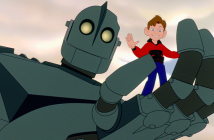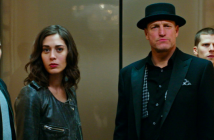
Editor’s Note: Morgan opens in wide theatrical release today, September 2, 2016.
In a key scene in Morgan, director Luke Scott’s feature-length debut, a psychologist, Dr. Alan Shapiro (Paul Giamatti), interviews the title character, Morgan (Anna Taylor-Joy), quite possibly the first of her kind, a synthetic human, created in an experimental, corporate-owned laboratory by researchers in the literal middle of nowhere (Northern Ireland standing in for the Pacific Northwest). The interview turns from friendly to antagonistic, from guarded curiosity to retaliatory reaction, signaling the end of Morgan’s slow-burn first half and the beginning of its predictably action-oriented, predictably disappointing second half. The scene functions as both a narrative pivot point and a callback/homage to Ridley Scott’s (Luke’s father) science-fiction masterpiece, Blade Runner. It’s the Voight-Kampf test all over again, the test administered to replicants in the Blade Runner universe to determine their human/non-human status. It’s also a sign that Morgan goes where practically every science-fiction/horror film involving scientists attempting to play God (i.e., creating life via unnatural means) has gone before.
Either through a lack of conviction, a desire to play it safe with his first film, or a combination of the two, Luke Scott lets Morgan devolve into yet another entry in the “Don’t play God” science-fiction sub-genre…
Before we get to that pivotal scene, however, Morgan unfolds slowly, with deliberate care, introducing the central character, Lee Weathers (Kate Mara), a corporate risk-management consultant tasked with investigating an incident at the aforementioned super-secret lab. She’s as cold, impassive, and inaccessible as her corporate attire, short, functional haircut, and driven personality suggests. The researchers at the super-secret facility include Simon Ziegler (Toby Jones) and Lui Cheng (Michelle Yeoh), the co-heads and de factor “parents” of the program, Dr. Amy Menser (Rose Leslie), a behaviorist, Darren and (Chris Sullivan) and Brenda Finch (Vinette Robinson), a couple, Skip Vronsky (Boyd Holbrook), the facility’s nutritionist, Kathy Grieff (Jennifer Jason Leigh) and Ted Brenner (Michael Yare), the remaining members of the research team. What they do or did matters less than what and how they feel about Morgan: Individually and collectively, they treat Morgan like they would their own daughter.
 Scott teases out Lee’s concerns about Morgan’s long-term viability (she’s a “product” after all, a prototype for a new series of synthetic servants and laborers apparently) and whether the researchers have made a potentially tragic, ill-fated mistake with their creation, committing a “category error” (treating Morgan as human when she’s decidedly not). They’ve equipped Morgan with a reactive skillset this side of Steve Rogers/Captain America, but their decision to accelerate her physical growth at the expense of her mental and emotional growth (see, e.g., Splice, Species) suggests a certain lack of foresight (setting aside, of course, the “scientists playing God” trope that runs through Morgan, a sign that doom potentially awaits the under-drawn, underdeveloped characters). As we eventually learn, Morgan’s uniqueness isn’t that she’s near human, but like the replicants in Ridley Scott’s Blade Runner, she’s been given emotions, the trait, not intellect, not physicality, that distinguishes human from non-human (Blade Runner proved the lie to that idea, making the replicants “more human than human”).
Scott teases out Lee’s concerns about Morgan’s long-term viability (she’s a “product” after all, a prototype for a new series of synthetic servants and laborers apparently) and whether the researchers have made a potentially tragic, ill-fated mistake with their creation, committing a “category error” (treating Morgan as human when she’s decidedly not). They’ve equipped Morgan with a reactive skillset this side of Steve Rogers/Captain America, but their decision to accelerate her physical growth at the expense of her mental and emotional growth (see, e.g., Splice, Species) suggests a certain lack of foresight (setting aside, of course, the “scientists playing God” trope that runs through Morgan, a sign that doom potentially awaits the under-drawn, underdeveloped characters). As we eventually learn, Morgan’s uniqueness isn’t that she’s near human, but like the replicants in Ridley Scott’s Blade Runner, she’s been given emotions, the trait, not intellect, not physicality, that distinguishes human from non-human (Blade Runner proved the lie to that idea, making the replicants “more human than human”).
Morgan goes where practically every science-fiction/horror film involving scientists attempting to play God has gone before.
Seth Owen’s screenplay leans heavily on science-fiction/dystopian tropes involving corporations (evil, as always). Characters repeatedly refer to the “Company” or the “Corporation” in hushed tones laden with fear and anxiety. The Company funded their research project and – through Lee – can decide to terminate it, with all that implies, but for reasons that remain intentionally murky or muddled, the researchers who created and nurtured Morgan harbor deep reservations about the Company’s intentions and plans. That sets up a virtual conflict between Lee on one side, the researchers on the other, and Morgan in the middle. Potentially, that conflict could have paid off in strikingly original or different ways, taking Morgan’s story into uncharted narrative terrain like Alex Garland’s far superior Ex Machina did just last year. Either through a lack of conviction, a desire to play it safe with his first film, or a combination of the two, Scott does the exact opposite, letting Morgan devolve into yet another entry in the “Don’t play God” science-fiction sub-genre that began almost two hundred years ago with Mary Shelley’s Frankenstein.
From one perspective, choosing a screenplay that tracks closely to Blade Runner’s ideas, concepts, and themes – Morgan ultimately unfolds as an alternate universe prequel or spin-off to Blade Runner – for your feature-length debut deserves, if nothing else, admiration or respect for the professional and personal risk it involves. Unfortunately, any credit for Scott’s decision to direct Morgan stops there. As unoriginal, derivative, unimaginative as Blade Runner was (and is) original, inventive, and imaginative, Morgan fails on practically every level. Scott’s style can be described as “no-style.” As a visual storyteller, arguably the elder Scott’s strongest skill as a filmmaker, Luke Scott is often found wanting, favoring the conventional set-ups of journeymen directors to more stylish filmmakers. As a narrative filmmaker, Scott falters even further, taking a literal-minded, self-consciously serious approach earlier on to thin, shallow material, then throwing all of that out in the second-half for a grab bag of desultory, indifferently choreographed and edited action scenes.
Morgan, director Luke Scott's feature film debut, is a grab bag of desultory, indifferently choreographed action scenes and a rip-off of his father Ridley's Blade Runner.



